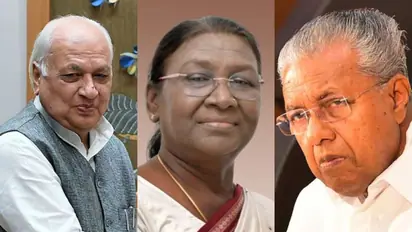Kerala Governor Arif Mohammed Khan informs seven bills sent to President, 3 withheld

Synopsis
Kerala Governor Arif Mohammed Khan on Thursday informed that the President of India gave assent to only one bill and three have been withheld that was passed by the Kerala state assembly.
Thiruvananthapuram: Kerala Governor Arif Mohammed Khan on Thursday (Feb 29) informed that of the seven bills that were sent for the consideration of the President of India, three bills have been withheld and only one was given assent, the Lok Ayukta Amendment Bill, 2022.
A tweet from the Raj Bhavan read, "It is informed that Hon’ble President of India has withheld assent to three Bills which Hon’ble Governor Shri Arif Mohammed Khan had referred to Rashtrapati Bhavan for consideration."
The three bills withheld by the Rashtrapati Bhavan are:
1. Kerala University Laws [Amendment No. 2] (Divesting Governor from the position of Chancellor of Universities) Bill, 2022
2. University Law Amendment Bill, 2022 [Expansion of Search Committee for the Appointment of Vice Chancellor]
3. The University Law Amendment Bill, 201 [Appellate Tribunal issue and other amendments to Technological University and others]
At the same time, a decision on the other three bills is awaited.
President Droupadi Murmu earlier approved the Kerala Lok Ayukta Amendment Bill. Governor Arif Mohammed Khan had sent seven bills for the President's assent. The development comes amid the ongoing tussle between the Governor and the state government. In August 2022, the Assembly approved the Lokayukta Amendment Bill. The Lokayukta's binding authority is reduced by the modification. Citing the amendment's unconstitutionality, the governor delayed signing the bill.
According to the current Lok Ayukta regulation, a public servant must step down from their position if it is determined that they have committed corruption. Sections 12 and 14 of this specific legislation are being amended by the most recent bill.
Therefore, moving forward, the chief minister will evaluate graft allegations against cabinet colleagues after the legislative assembly reviews corruption charges against the chief minister. Similarly, the charges against the MLAs will be reviewed by the speaker.
Stay updated with the Breaking News Today and Latest News from across India and around the world. Get real-time updates, in-depth analysis, and comprehensive coverage of India News, World News, Indian Defence News, Kerala News, and Karnataka News. From politics to current affairs, follow every major story as it unfolds. Download the Asianet News Official App to stay informed anytime, anywhere.